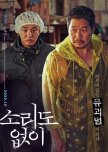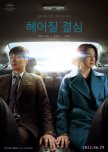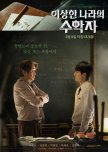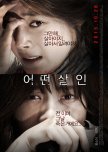
A masterpiece lost because of the haters
I don't know where to start lolFor me, it was a very wonderful drama, I enjoyed every moment while I watched it .. It was really a luxurious drama ..
I don't understand the reason for all the fuss about this drama as it was badly criticized! And the biggest reason for criticism was the large number of ads! Is this really a convincing reason! Is the story really badly complicated! For me, it is a distinct drama in that the story is written with a plot, and this is what distinguishes the writer, and also you must follow the episodes at every moment in order not to miss a new secret .. Really amazed me by the beauty of the story so that it was not just a fairy tale about love and revenge, but rather a well-written story ..
As for the ads, that did not bother me at all, because because of the large budget of the series, they had to compensate for that through advertisements, but the director tried to place ads in several ways, but they were very visible, but that's okay. This is not a convincing reason to hate the series ..
As for acting, the whole crew has excelled in acting. I really lived in the series hahaha
If you like special, luxurious and extraordinary series, follow this series. I promise you will not regret and Do not take the words of the critics into account .. Really, this series has been wronged by some of the haters ..
I fell in love with the series and the entire cast. It's a show for high-end minds only, not for the trivial ^^
Was this review helpful to you?

This review may contain spoilers
that life can be meaningful if we’re brave enough to let ourselves be vulnerable.
How do you cope with the loss of a family member? How do you tear down the walls you’ve put up to protect yourself from the outside world without crumbling under the weight of all the pain? And how do you ultimately learn to open up to the world again, and to form new connections and be vulnerable, with the awareness that, one day, they might leave too? Screened in competition at the 2021 Torino Film Festival, Aloners (Hon-ja-sa-neun Sa-ram-deul) deals with these and many more themes, from the struggles to process grief to the ghosts of the past that still weigh on our shoulders; from all the repressed anger that comes from a lifetime of buried emotions to the need to set boundaries with toxic family members; from how difficult it is to reach out and ask for help to the universal truths we keep hidden, such as the fact that life is often devoid of meaning and that we don’t really enjoy being alone all that much. Aloners is filmmaker Hong Sung-eun‘s (also the film’s writer and editor) feature directorial debut, but you absolutely wouldn’t think it was, judging by the complexity of its themes and by the sensitivity of a screenplay that effortlessly draws you in, crafting an atmosphere that is drenched in intrigue, mystery, emotion, and subtle irony.The film centres on Jina (Gong Seung-yeon, also in her feature debut), a woman in her late twenties who leads a repetitive (and highly relatable) existence: Jina works at a call centre, where she spends her time apologising to entitled clients who are often in the wrong, ignoring their insults, and accommodating their absurd requests. On her way back to her apartment, she walks on her own, her eyes glued to her mobile phone. At home, she lives by herself, and avoids interactions with her neighbours. She eats her dinner on her bed while watching TV and falls asleep not long after that, only to wake up the following day and have the exact same experience over and over again. In fact, not only has Jina managed to survive such a monotonous lifestyle for so long, but she’s also become exceptionally good at it: she’s currently the top employee at her workplace, due to how many phone calls she manages to answer (and endure) each day. But there’s a reason why Jina is so successful at being alone: quite simply, she has lost all interest in having interactions with others, be it her neighbours, her coworkers, or even her own family. Instead, she has chosen a life of seclusion and embraced the fact that her existence has no meaning.
But Jina isn’t the only “aloner” in the film. Her father (Park Jung-hak, of The Land of the Waves) also lives on his own, due to Jina’s mother’s recent passing, which left him a widower. His way of coping with his wife’s death is the opposite of Jina’s: he spends his days attending religious functions and turning his daughter into a scapegoat, guilttripping her into keeping him company and unloading all his guilt onto her to avoid facing the fact that he wasn’t present enough in his wife’s life. Also alone are Jina’s neighbours, a mysterious young man (Kim Mo-Beom) who attempts in vain to have a conversation with her every morning until he dies in mysterious circumstances, and a new neighbour, Seonghun (Seo Hyun-Woo, of A Taxi Driver), who rents the former resident’s apartment after his passing, and who’s temporarily on his own because his girlfriend believes his new flat to be haunted.
And then there’s Sujin (played by newcomerJung Da-Eun), a new employee at the call center that Jina has been given the task to train, and who keeps trying to befriend our protagonist, having just moved to Seoul from Chuncheon, where all her friends are. Through all these figures, not only does director Hong Sung-eun alert us of just how many people are living alone nowadays – so much so that the Korean term holojok has been coined to describe the people in the country who “prefer to be left on their own,” but also presents us with a story with more than one protagonist, each with their own distinct lives and points of view, and each with their own truths to keep hidden.
And there are quite a lot of unexpected things happening in Aloners, some more puzzling than others. There are tensions at Jina’s workplace, even more so after the balance is altered by the arrival of Sujin, as the newcomer’s enthusiasm and curiosity clash with the disillusionment of seasoned call centre workers who stopped trying to find any meaning or enjoyment in their job a very long time ago. There’s a demanding boss (Kim Hannah, of Shang-Chi and the Legend of the Ten Rings) who can still relate to her employees, underneath it all, and there’s a neverchanging routine that is turned upside down the moment Sujin arrives, bearing gifts that will come to assume different connotations later in the film. But there’s a lot more than that. There are wills that don’t make sense, people who secretly spy on others but aren’t able to communicate without placing or receiving blame, and people who are trying their hardest to open up to others but don’t know how. And then there are things that might or might not be happening in places that may or may not be haunted, mentally ill time machine-builders who might actually be geniuses, and people who are gone but still very much present in the memory of others.
Even that description doesn’t do Aloners justice, as there is just so much condensed into the film’s 91 minutes screentime, and Hong Sung-eun’s assured direction and delicate writing ensures we are always shown, not told not just what happens in the film, but also what remains unsaid. Different viewers will get a different message out of the film, depending on their own experiences and mindsets as they go into the screening. There’s social commentary on modern life, as you might expect, but there are also moments of irony and mystery to keep you entertained, as well as fantastic performances by Gong Seung-yeon and Jung Da-Eun that will haunt you long after the credits roll. There’s the occasional twist you won’t see coming, and there’s a very well-crafted, complex father-daughter relationship that perfectly encompasses the kind of baggage that affects our every interaction with our family members. Aloners is a film about processing grief, learning to let someone go, and letting yourself feel, with the awareness that, once all the walls you’ve put up are broken and your defences are gone, there’s no going back.
Yet, to me, the film is first and foremost about the burden we all silently share as human beings, and the kinds of truths that often remain unsaid just because it would tarnish the facade we’ve spent all these years perfecting. We have become so accustomed to not having a reaction when someone hurts us, apologising when we should be insisting on being treated with respect, and defending ourselves when we should be apologising that we’ve forgotten how to be vulnerable, and how to accept ourselves for who we are. Most of all, we’ve forgotten that we’re all alone, underneath it all, and that every single one of us shares the same fears and uncertainties. By taking on a journey with Jina and the other “aloners,” the film ultimately shows us that honesty and acceptance are the answers, and that, if we are brave enough to share our baggage with the right people, we might be able to find this existence of ours a little more meaningful, after all.
Was this review helpful to you?

This review may contain spoilers
A story with several meanings
Although Tae-in reluctantly took in the young girl, Cho-hee, to stay at his place, they eventually started gaining trust and opening up to each other. To me, this shows symptoms of Stockholm syndrome, which is a psychological connection formed with their captors during captivity. Although Tae-in did not intend to abduct Cho-hee, ultimately he is still a kidnapper who hid her away from the public eye and stopped her escape attempts. Cho-hee bonded well with Tae-in’s younger sister, and at times, it indeed felt like she was truly happy there and did not want to leave the place. Although we don’t know much about her family, but it was brought up several times in the movie that her family obviously doted on the son more, and she was actually not the intended kidnap target as well, highlighting the issue of patriarchy in her family.However, at times the line between whether if Cho-hee is suffering from Stockholm syndrome or not is quite blurred, as both Tae-in and Cho-hee could not make up their minds on how they perceived each other. For Tae-in, he just wanted to quickly get the job done and send Cho-hee away, however he still had a conscience when he knew that Cho-hee’s life was in danger. As for Cho-hee, she couldn’t decide to trust Tae-in or not, but ultimately, she makes her decision at the ending, which I will not spoil here.
Since Yoo Ah In has no lines in the movie at all, his actions and body languages are quite obvious and easy to understand, without being too exaggerated. From his expressions, ranging from joy, to worry and desperation, his character, Tae-in was able to communicate well and relate his thoughts with the on-screen characters and with the audience watching the movie. In an interview, Yoo Ah In described his character as such, “Tae-in doesn’t speak. I don’t think he is unable to speak at all as he makes some noises sometimes. He refuses to communicate with the world for some reasons.”
Overall, this movie has various blurred lines, on the overarching theme of good and evil – for the audience to interpret in their own ways, such as the lead characters working in a job that is essentially a crime, but what they do could also be rationalised as okay; and if Tae-in and Chang-bok are actually good or bad, as they are kidnappers, albeit kind-hearted ones who actually looked after their abductee. The movie ending itself is something that we did not really expect, but it does match the overall theme well.
Was this review helpful to you?

Featured story
If elder abuse is a taboo subject that is rarely afforded the serious consideration and action that such horrors demand, then elder sexual abuse is even more so. Playing at the 2020 Toronto International Film Festival as a Private Screening, with her film An Old Lady, South Korean filmmaker Lim Sun-ae tackles an extraordinarily challenging subject with such enormous grace, delicacy, compassion and thoughtfulness that it renders this close-to-perfect film as one of the year’s most easily missed cinema highlights.The film follows Hyo-jeong (Ye Soo-jung), who we first meet in the film’s opening moments in total darkness. Over a black screen, we hear her politely chat to a male nurse during a physical therapy session, his flattery increasing until a narrative ellipses and a dramatic cut to the abstracted, empty hospital itself implies without relying on sensationalized explicitness that something has clearly happened. As the title suggests, Hyo-jeong is very much a “lady” in the most traditional sense of the word; she is polite, reserved, and clearly does not like to make a fuss. How a 69 year old woman who has been raped in a hospital by a care giver responds to this situation is largely the question around which An Old Lady spins.
While there are numerous factors that render An Old Lady such an important film, the combined performance of Ye Soo-jung with Lim Sun-ae – the latter of whom also wrote the screenplay – is very much the engine that drives the film to its gentle but authentic conclusion. Making a film about rape is already a ethically challenging terrain, but by so fearlessly deciding to add the element of elder abuse to the equation, Lim Sun-ae proves herself to be braver than most.
Even more importantly, of course, is how well she succeeds: Hyo-jeong is never reduced to a pathetic victim, but neither is she patronizingly rendered as an unbelievable superhero. Her challenges feel real and are handled with great sensitivity: was the encounter consensual and did Hyo-jeong merely forget, possibly suffering from the first stages of dementia? The questions Lim Sun-ae knows the audience are, in our most shameful moments, asking ourselves are made explicit in the film by Hyo-jeong herself as she struggles to deal not only with the trauma of what happened to her, but her lack of faith in her own capacity to remember it with clarity.
There’s a sense of sadness with a film this courageous and well executed about such a difficult subject that it will go largely unseen, the taboo nature of the subject matter alone turning an audience off. But that alone is precisely what makes this film so urgent; An Old Lady tells us something we don’t really want to hear in a way that makes us forget why we refused to listen for so long.
Was this review helpful to you?

bulldozer girl
The title “The Girl on a Bulldozer” is one that generates a fair bit of curiosity regarding the feature’s content. Who is this girl and what is she doing on a bulldozer? The poster, which depicts a petite girl driving a massive bulldozer as loose soil clouds around it, hints at a possibly gritty, slightly action-y content. In his Busan Film Festival welcome message, director Park Ri-woong mentions that this is a revenge story, heightening expectations even further. Having seen the finished product now, I can safely say that this is one of the most wrongly marketed films this year. This is in no way a negative remark on the actual quality of the production, and to be completely fair, it does eventually deliver what it promises, but Park Ri-woong’s debut is more than a standard gritty thriller.Go into “The Girl on a Bulldozer” expecting a gritty crime thriller and one is most likely to be disappointed. Yes, there are bulldozers, but the girl gets on one for a grand total of two times in the 113 minutes of its runtime. The grit as seen in the promotional poster is practically non-existent. Sure, the revenge as mentioned by the director in his welcome message is exacted, but it doesn’t happen until the final few minutes. Despite all of that, this narrative works first and foremost as an excellent character study. It of course helps that the events around her are fairly engaging to keep the story progressing, but Hae-young is such a well-written character that it is fascinating to see her go on her own internal journey as much as it is to see her try and solve this mystery. There is a lot of angst with her, towards authority, family, society and life in general.
Slowly, as the layers of her story are peeled, this anger converts into pain, a pain that is coming from taking on so much and going against so many at such a young age with so much stacked against her. The feature’s title too works in more than one ways. Besides the obvious, Hae-young is figuratively also going through life on a bulldozer, razing much in her wake. Her anger gets the better of her in most situations, affecting relationships. Her bullish ways and thoughtless actions often land her in irrevocable problems. Even her ultimate action, her revenge if you will, is a cry of desperation, born out of a helplessness to think up much else.
Such a complex character would’ve failed in less competent hands but in Kim Hye-yoon’s, it becomes highly compelling. She may be only four films old and this is her first leading role and thus the meatiest, but Kim brings much maturity to her performance. Despite Hae-young’s vulgarity spitting, tough exterior and fist fighting ways, Hye-yoon manages to play her very delicately, bringing this briefly evident naivety that flashes across her face now and then. This is further enchanting to watch when her anger changes, when she knows she may be way in over her head and when she finally lets it briefly break her. That particular moment is a tender one, shared with her young co-star. The adults around her are effectively cast, but it is ultimately Kim Hye-yoon’s performance that looms large over the feature and the one that lingers back in minds.
The cinematography stays true to the production’s indie roots and the sparsely used music has a few moments of impressiveness, but “The Girl on a Bulldozer” proves an effective debut from Park Ri-woong, thanks to a very well-written character and a compelling and constantly progressing story, all of which is anchored by a superb lead performance from Kim Hye-yoon. Both she and director Park are names to be on the lookout for..
Was this review helpful to you?

One of the best comedy movies
The plot is simple, a lottery ticket scramble between South Korea and North Korea. But the story was successfully developed and presented with a very fresh comedy from the beginning to the end of the film! Let it be a comedy film, but it really feels and looks that this film is not a cheap film!The comedic duo Go Kyung-pyo and Lee Yi-kyung as the main characters have no cure. Seeing them silent, I couldn't help but laugh. Moreover, all the character designs and supporting characters are really strong and the chemistry is really felt. Laugh until you cry.
The storytelling is also neat! This film takes 3 perspectives: South Korea, North Korea, and the perspective of the prize money taker. EVERYTHING is FUNNY until the details of the story are made hilarious.
Comedy is the main point of this film. Every moment of comedy that is shown is really strong and never fails to make the audience laugh.
In conclusion, 6/45 is a MUST watch movie with friends and family who enjoy comedy films. Those who are tired and need to laugh also have to watch this, alone it's also not a problem because it is guaranteed that you will be entertained.
Was this review helpful to you?

A mixture that resulted in a masterpiece
was another Korean movie to release this summer that I was highly, highly looking forward to. One of the biggest reasons why I was so hyped for this film was because it was directed by the legendary Korean director, Park Chan Wook. Director Park is one of the most well-renowned directors of Korean cinema; up there alongside Bong Joon Ho. Some of his other masterpieces include , , and of course, , all of which are MUST watches. Also, a film with a mixed genre of thriller and romance? Sign me up! Had me intrigued from just the genre.Moreover, it’s been over 6 years since Director Park’s last work, and with the mind-blowingly good film that Director Bong put out a few years back, it’d be an understatement for me to say I was excited to see what Park Chan Wook had under his sleeve.
The film starred the duo of Park Hae Il and Tang Wei, and these two were absolutely amazing. I’ll get more into this later on in the review.
>The Good<
The movie definitely had a uniqueness that only Park Chan Wook can deliver. Amazing cinematography with incredible camerawork and angles had me mesmerizing each scene. You can tell that each shot, each angle was thought out, and shows how much of a detailed person Director Park is.
Moreover, there were symbolisms and metaphors throughout the film, one of which we can find across Park Chan Wook’s movies: ants. And like many of Director Park’s other works, the film had strange vibes to it that gave it its own, unique mysterious elements. Mystery, thriller, romance; an odd blend, but it works, and it’s because of Park Chan Wook that this is possible.
Furthermore, the film had great musical score that really enhanced the tone and the mood. It’s with its auditory elements that the film was able to be elevated on another level.
I also loved how keeps you guessing. It keeps you wondering what’s going on, and as it starts revealing, it gets a little confusing, but in a good way. You keep trying to fit the pieces of the Park Chan Wook puzzle together, and I absolutely love it when films are able to accomplish this successful. The movie then takes a turn and gets you even more invested; love it.
Another great part about was the acting. Tang Wei’s acting was amazing; her expressions, like when she slightly smiles, was subtle but gave off an impression that can’t be put into words. All I can say is that it was “Scary good.” And Park Hae Il also showed his best in this. His and Tang Wei’s chemistry was out of this world, and definitely one of the biggest reasons why the movie was so good.
And it wasn’t only with the two main leads, but it was fun seeing all the cameo appearances as well. Park Jung Min made a special appearance and had a pretty impactful role, but the one that really stood out to me was Kim Shin Young. I was really caught off guard when she came on screen. Kim Shin Young is a famous comedian in Korea, and she was the last person I was expecting to see, especially in a Park Chan Wook film in this type of genre. But man was she good! She pulled off the role VERY well, and you would think she’s a seasoned actress.
>The Bad<
I’ll be honest, the movie is on the longer side. There were parts with pretty slow progression, and you’re gonna need some patience. As I said before, the movie takes a turn, and it’s going to take a while for that to come. And even after, there still is a lot left in the film. Not saying the movie was bad because it was slow; not at all. But am saying that it’s definitely gonna be a little too slow for some people. For me, I’m gonna have to watch it again to fully understand and grasp the full picture.
>>Verdict<<
was definitely different, in a good way. It had that unique characteristic that comes with Park Chan Wook films, and I found it to be closer to and than . The film was beautifully shot, and had perfect casting and chemistry with Park Hae Il and Tang Wei. Absolute incredible performances by both actors. The movie did feel pretty long, but it wasn’t so dragged that you don’t want to watch. In fact, I actually want to watch again.
Was this review helpful to you?

More important than the answer is the process of finding the answer
I haven't seen an interesting movie in a long time. The acting of the high school actors was good, but as expected, actor Choi Min-sik seems to be a trustworthy movie actor. In the fun part, he makes the movie not boring while acting cheerfully, and in important lines, he gives a serious acting to convey a message to the audience, so the movie is expressed more deliciously. Besides Choi Min-sik, the chemistry with Jo Yoon-seo, who played the female lead, Park Bo-ram, and Kim Dong-hwi, who plays Han Ji-woo, was also very good. You did a great job in acting as a fresh high school student. If it was a little disappointing, I felt that the content was a little distracting at the end of the movie. When watching this movie, I felt that it contained more meaning when viewed from a different point of view from a mathematical point of view.If you look at it from the point of view of life, not just math, it's a very good word. As I was living my life, I looked back at my life to see if I had lived only by the results. It made me think about how I should live my life.
I advise you to watch the movie even if you hate math...
Was this review helpful to you?

An unflinchingly hard-hitting and vital piece of cinema
Rape is never an easy subject to tackle in film, either dispassionately or without becoming exploitative. It is hard for men to appreciate the women’s suffering while woman are unlikely – and justifiably – to be able to contain their rage. Another issue, objectively depicting the reactions and fallout in a staunchly patriarchal society, forms the basis of this deeply harrowing film.In his debut, Ahn Yong-Hoon bravely takes a direct accusatory swipe at Korean society as a whole for their treatment towards sexual abuse victims and women in general. Through a number of unpleasant threads all connected by the theme of the male superiority over women, this bleak and unsettling watch makes its point by taking it to the extreme as one tragedy after another unfolds.
The men don’t come of too well in this film yet this isn’t exactly a rousing feminist clarion call either, but it is a provocative essay on a subject that should affect both genders, even if it causes 50% of the audience to rethink their attitudes. Admittedly, the plot is driven by a number of contrivances but each one highlights the various issues and unjust traumas female victims endure.
For a debut effort Ahn Yong-Hoon’s direction is assured and bold, employing classic noir tricks to create atmosphere in lieu of a musical soundtrack, whilst building tension through innovative angles and framing. The first act is a bit choppy with the various subplots being set up through random appearances that distort the timeline but once it settles down, there is no turning back.
But this film belongs to Shin Hyun-Bin, whose essaying of the tragic and traumatised Ji-Eun is an astounding example of immersive acting. From nuanced delineation of a distraught mind to the minutiae of her body language, Shin delivers a tour de force performance of aching precision and intensity.
The Lost Choices isn’t a film about delivering solutions or empowering women; it shows us where society is going wrong and warns us of the worst that can happen if we don’t revise our attitudes.
Was this review helpful to you?

“It goes from heartless in the beginning to heart-wrenching in the end.”
Bulgasal is very much in the mold of the great epic poems. It is a story on a grand scale (albeit, within the production limitations of the COVID era) revolving around our hero (or anti-hero, depending on where you are in the story) and all the characters around him. It is an epic journey, both physical and emotional, that takes place across centuries. And involves some very real and sincere human emotions mixed with both frightening and magical fantasy.Perhaps the best aspect of Bulgasal is the series being sure of what it is and wants to be. It ensures that the proper tone to make that happen is maintained throughout. Often times with high concept, action-heavy Korean dramas, there is the urge for those shows to forcibly insert contrived side stories and bouts of levity in places where none of those things sensibly belong. Fluffy romance or slapstick comedy is inexplicably inserted into psychological thrillers or apocalyptic adventures.
And while those things can certainly be included in a way that makes sense, more often than not, those moments merely work to derail what can already be very tenuous and fragile stories.
Not here on Bulgasal. The dark, melancholic aura is both fascinating and refreshing. The series even begins with a unique Gothic vibe as the stage is being set for our main characters with the backdrop of a mysterious and monster-filled world. (And “monsters” in the loosest sense as well.) The contrast of the darker story and the sometimes warm visuals and cinematography adds to the series’ dynamic energy.
There are no unnecessary side trips or fan-service moments to break the story’s momentum. No contrived situations to pierce the consistent flow. And because of that, there is not a wasted minute across the 16 episodes. Every scene and interaction is used to create and develop the necessary depth to help make every surprising twist and turn and every emotional climax resonate.
Because of this, it is advisable to take it slow when watching the series. When bingeing Korean dramas is the norm these days, Bulgasal is best consumed slowly and carefully. That will allow the viewer to better absorb all that is happening on screen. It’s not that the story can get complicated (which it does). But being able to truly take in every emotional beat of the story will help raise the level of emotional satisfaction for the series’ many climactic moments.
And of which there are many. The balance of character-driven story and plot-driven intricacies is another of the series’ major accomplishments. Hopping along for the ride will lead you through an exciting narrative. Taking in the sights along the way points you toward the wonderful cast of characters and their diverse relationships.
What makes Bulgasal even more appealing is how it can focus on very real human emotions in the midst of a fantastical and dark world. Touching upon relationships in all its forms. From friendships to family and from rivals to comrades; the bonds that are formed between people (and non-humans as well) can transcend time and space. Those meaningful connections that can shape a person’s life can always make for engaging stories. And that is very much the case here.
The central plot is revenge with a twist. But each character, including Dan Hwal, are more than just out for blood. Being able to overcome difficulties and finding that connection that can help you not only move forward, but help you stand today is presented in such captivating fashion in this series. It is through these relationships, good and bad, that propel the series forward. And the relationships provide the depth necessary to hold the story and mythology together.
Helping to make that happen in addition to the tight writing and cinematic visuals is an excellent cast. And with the idea of past lives and reincarnation integral to the development of the story, many of the cast end up doing double duty (and then some).
Kwon Nara has had many memorable performances already in her career. And as Min Sang Un, she delivers another one. As Sang Un is a very complicated character, especially with a past that is unknown to her at first, Kwon Nara must navigate the ever-changing circumstances her character finds herself in. Kwon Nara is able to roll with the punches (literally too!) and keep up with her character’s and the story’s many surprises.
Gong Seung Yeon also delivers a great performance as Min Si Ho (among other characters) and similarly must juggle different emotions and situations without skipping a beat. The same can be said for veteran actors Jung Jin Young and Park Myung Shin who both also effortlessly bring to life multi-faceted characters. Both of their characters are parental figures at times, but also have their own well-developed stories. Kim Woo Seok, meanwhile, makes his network drama debut in a role that sees his character experience perhaps the most growth over the course of the series. And he too has no problem delivering a performance that is endearing and strong.
An ensemble cast of young child actors also deserve praise as many of the series’ most emotionally affecting moments are delivered and made possibly by the performances they deliver.
But the series’ two standout performances come from Lee Joon and the always powerful Lee Jin Wook.
Lee Joon plays the mysterious and ominous Ok Eul Tae. Without giving too much away, he is very much the series’ biggest antagonist. But Eul Tae as a character has a very detailed and integral part to play in the grander narrative. And because of that, Lee Joon must bring Eul Tae to life in a way that matches the character’s relevance to the story and to our title character. He absolutely accomplishes that. You can tell how much Lee Joon relishes this role in which he has the opportunity to both play up the danger and evil while allowing just enough vulnerability and quiet insight to keep the character grounded and relatable. That is important especially in terms of how his character has a major part to play in the story. And his performance absolutely helps to elevate an already strong story.
And of course, Lee Jin Wook needs no introduction. With every role, he is able to prove time and again that he is one of the best and most charismatic leading men in the industry. Bulgasal is just another opportunity to show that and he more than does so.
As Dan Hwal, he must deliver a nuanced performance that carries with it the weight of the entire series. Being able to immediately connect with the character from the start is important. And then having to navigate the character through the many twists and turns is of high priority in order to keep the series from falling apart. But Lee Jin Wook is just that kind of actor. It is a commanding performance that has him effortlessly cycling through a range of emotions from scene to scene.
Lee Jin Wook grabs you from the very first time you see him on screen and he never breaks that connection with the viewer up until the final moments of the series. Other than the story itself, if there was a glue that holds the series together, it is Lee Jin Wook’s performance and the chemistry that he fosters with the rest of the cast.
Bulgasal puts all this together in a way that results in a truly epic and grand presentation. It carries a bit of heft and even gravitas, especially in the way the series is able to take itself seriously without giving off an air of pretentiousness. (Also another problem for many drama series in recent years.)
Overall, Bulgasal: Immortal Souls is a unique series that manages to mix the familiar with the fantastical. Its excellent cast, tightly written and intricate story and cinematic production make for a thoroughly exciting and emotionally satisfying series.
Was this review helpful to you?

A movie that makes you feel like you're in danger
Directed by Kim Tae-joon, Unlocked is a South Korean thriller starring Chun Woo-hee , Park Ho-San, and Yim Si-wan. The movie is new to Netflix from today, and is a decent little techno thriller which looks at stalking in the modern age.The film sets up the idea that anyone can become a victim of digital surveillance, it is merely a case of momentarily dropping your guard. And then once someone gets inside your phone, they can get inside your life, and use your information however they see fit.
There is a little more to the film than just a bit of online stalking, as Unlocked also includes a police investigation, which plays in the background of the film. The two plot threads are of course connected, demonstrating just how deep and frightening this type of situation can be.
Director Kim Tae-joon has good grip on the material in this picture, and taps into the reality of the world we are currently living in. We have all become too reliant on technology, with most of us guilty of handing over a bit too much information online, and his film demonstrates the worrying side of all this.
He then backs this all up with a great cast, some strong shots, a fairly even tone, and a good soundtrack. Unlocked isn’t amazing, but it is pretty solid, and finds way to inject some thrills, a touch of paranoia, and plenty of drama into the story.
Unlocked may not rock everyone’s world, but it makes for a fine watch. There are some interesting ideas in here about hacking, spyware, and cyber-stalking, and it offers just enough story to make it all work.
You probably won’t come away thinking this is the best thriller you have ever seen, but you may have second thoughts about uploading so much information online. You may also consider super-gluing your phone to your hand, to deter anyone from trying to access it.
Was this review helpful to you?

Life is really beautiful.. let us live it as we want
Life is Beautiful (2022) is a musical romance film that stars Yum Jung-ah, Ryu Seung-ryong, Park Se-wan, and Ong Seong Wu. The film depicts the journey of a woman who discovers she has cancer and takes a road trip to meet her first love from high school.Despite wrapping filming in 2020, the film experienced long premiere delays due to the COVID-19 pandemic, reported Korea Times. After a nearly two-year-long wait, the film premiered at the 36th Fribourg International Film Festival in Switzerland, and is now ready to take us on a beautiful adventure.
The film takes its audience on a wonderful rollercoaster of emotions, with seamless mood shifts. From the sadness of a terminal illness to the hilarity of the main couple’s endless bickering, you can’t help but be immersed in the drama and empathise with every character. By the end, there wasn’t a single dry eye in the house.
Of course, with a star-studded main cast, hopes were high, but the actors’ performances exceeded expectations. Yum Jung-ah and Ryu Seung-ryong’s chemistry as a married couple was especially fun to watch.
This musical extravaganza will not only bring you on an emotional roller-coaster, but also take you on a tour around Korea through the ages.
Needless to say, audiences can be sure to walk out of the cinema with that nostalgic feeling of first love, knowing that life truly is beautiful.
Was this review helpful to you?

A magical and surprisingly deep drama
“Do you…believe in magic?” These five words perfectly capture the essence of Netflix’s newest K-drama, The Sound of Magic. These are also the words uttered by the enigmatic magician fronting this series, Ri-Eul. But is he really magic? Or is everything one big misdirection?The Sound of Magic plays with this idea constantly, combining elements of The Miracle on 34th Street, Goblin and Extracurricular, blending them together into a beautifully surreal and incredibly thought provoking series.
What begins as a fantastic journey into the world of magic soon takes a dark turn as we’re left to question exactly what we’ve seen.
I’m being careful not to go into spoilers here but suffice to say, The Sound of Magic is a magical series; a wonderful, hedonistic ride boasting strong themes at the heart of this one that gives it a good amount of depth.
The story itself focuses on Ah-Yi, a poor school student who ekes her way through life, struggling to get by. After her mother leaves and her father goes on the run from loan-sharks, Ah-Yi is left with nothing. Se’s struggling to pay her rent and trying to keep up with studies while working part-time. Ah-Yi is in proverbial hell.
Screaming out for help, Ah-Yi’s cry is seemingly answered by Ri-Eul, who encourages her to show up at an abandoned theme park for a magic show she’ll never forget.
As Ah-Yi allows herself to indulge into this fantastical world, she becomes taken with this guy and learns more about the magical world he adopts. Unfortunately, Ah-Yi’s fellow student Il-Deung does not share her enthusiasm and worries that Ri-Eul may be hiding a darker truth.
I won’t go further into the story but the dialogue has been masterfully crafted to deliver little foreshadowed hints to what’s going on.
Beyond the surface level story about magic though is a much darker theme revolving around stress, societal pressure and what constitutes as “normal.”
In this increasingly digitalized world, we’re under more pressure than ever before to portray our best selves at all times. Because of that, those who dare to stand out from the norm or carve a different path for themselves are vilified.
The Sound of Magic plays with that idea to its very core, examining and dissecting what it means to be normal and how the childlike innocence of our youth is ripped apart and replaced by studying, working and trying to pay our bills.
These themes are never explicitly mentioned though, as a lot of this ticks away in the background. Likewise, we’re also not really told some of the more pressing questions one may have about Ri-Eul. While some will be disappointed by this, I personally think it works really well to maintain that aura of wonder and suspicion, which are the two feelings this show conjures and perfectly balances across its run-time.
What’s particularly interesting with The Sound of Magic though is the way this is presented. The whole series is laid out like a musical production at the theatre, complete with musical numbers, a revealing post-credit sequence (no spoilers here!) and a lot of whimsical and fantastical elements thrown in along the way.
Magic tricks aside, The Sound of Magic also has a smattering of dream sequences, interesting choreography and some breath-taking shots of Korea too.
The Sound of Magic won’t be for everyone but the series does a fantastic job fleshing out all of its characters, delivering a simple but effective story and layering all of that with thought provoking and relevant themes about society and our place in the world.
It may not be the best K-drama of the year, but it’s certainly one of the more surprising. This one’s a definite must-watch.
Was this review helpful to you?

This review may contain spoilers
Featured movie
In the sleepy outskirts of Gangreung, eleven year old Bori (played by Kim Ah-song) lives happily with her family. We see from the first that Bori has some mild resentment of her younger brother Jeong-woo (played by Lee Rin-ha), but this mostly seems to just be because he's the baby of the family. "Bori" transitions softly into familial relations, with a big cuddle-in between family members masking the inevitable revelation that, though Bori herself can hear, the rest of her family is deaf.Yet writer/director Kim Jinyu wisely avoids unnecessarily overwrought drama, presenting the deaf family as a family first. Their deafness deceptively seems like an afterthought. This is particularly intriguing because as we see, there does not appear to be any deaf community to speak of in Gangreung. All of Bori's outbound friends and family members hear. This helps explain the particular closeness of Bori with her younger brother and parents. They're all locked away in their own world.
Interestingly enough Bori herself doesn't see matters that way. What I interpreted as simple sibling rivalry Bori ultimately concludes is actually a matter of her always permanently being at a distance from her parents because she is not deaf, though her brother is. "Bori" deals a lot with subtle communication. We see how what to us is obviously a happy functional family is, to Bori, permanently flawed, because she can recognize the passionate nuances of sign language and how they're missing from her own filial communications.
Though this is a critical element of the film it's very easy to miss, in part because I don't sign. But "Bori" writ large is quite proud of its status as being a movie firmly entrenched in the deaf community, with the Korean language version I saw featuring Korean subtitles for all the speaking portions. Yet the coming of age story is quite simple and appropriately childlike in construction. Stripped of sensational elements, "Bori"'s own message is simply that the deaf lifestyle is different, containing remarkable nuance.
Indeed, Bori's attempts to make sense of this nuance are the main central point of the conflict that does eventually manage to pop up. Bori is growing up. She's finally starting to notice things that weren't so obvious to her before, asking questions to better understand them. And then, equally appropriately, Bori simply repeats her questions when she dislikes the implications of what she has been told. Bori is sneaky but not very good at it, since she's been raised in a loving household where sharing is warmly encouraged.
It's all enough to make one very envious, honestly. Take the beautiful backdrop of the beach town where Bori lives. There's an easygoing atmosphere that is contradicted yet emphasized by the big festival which takes place early on. Discussion of this festival makes clear, once more in truly effectively subtle fashion, that deaf people too enjoy fireworks. Likewise, we learn how Bori herself is a mess of contradictions, and slowly see the arc forming of how Bori must grow up by making sense of these contradictions.
You really will enjoy the movie ... It is really special
Was this review helpful to you?

A movie full of suspense and excitement.. you should not miss watching it (^-^)/
Starting from buying second-hand items on an online shopping platform, Soo-Hyun (Shin Hae-Sun) fell victim to a scam and intended to report the fraudster. Instead of getting her money back, she found herself subjected to a series of relentless terrors.Korea has never run out of storytelling ideas, and in this film, Korean cinema explores the issue of online shopping scams that have victimized many.
The story is meticulously crafted, and its mystery leaves the audience questioning who the real culprit is. Terror after terror is delivered gradually with various ‘crazy’ methods that keep the viewers on the edge of their seats.
Shin Hae-Sun delivers an outstanding performance, and the villain’s presence is filled with malevolence that makes the audience feel afraid whenever they appear.
The various terrors depicted, coupled with the investigative elements from the police, left me intrigued by the story until the end.
The climax is brilliantly executed, with an escalating intensity of terror. Many viewers applauded when the film concluded.
For fans of the thriller genre, TARGET is guaranteed to keep you on the edge of your seat!
Was this review helpful to you?






















